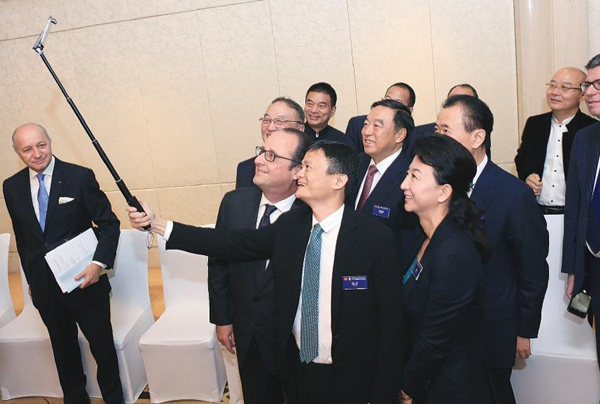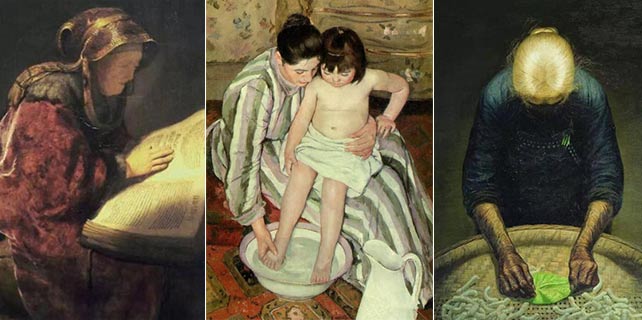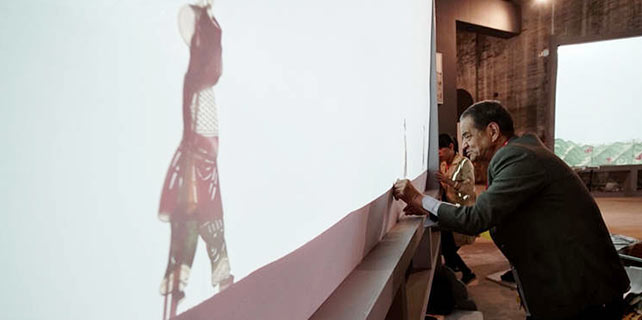High-flying pillars of business diplomacy
 |
|
JACK MA, founder of e-commerce giant Alibaba, and other members of the China Entrepreneur Club take a selfie with outgoing French President Francois Hollande in Beijing on Nov 3, 2015. |
Led by Jack Ma, elite entrepreneur club is building trust overseas to help Chinese firms extend global reach
Not only are they China's most famous business leaders, they are also important envoys of public diplomacy eager to spread the word globally about the country and its thriving entrepreneurship.
Since 2011, the China Entrepreneur Club has made 12 overseas visits to countries including the United States, the United Kingdom, Germany and Italy. At each destination, members engage with the highest echelons of government and leading companies and entrepreneurs to discuss a wide range of issues.
During Canadian Prime Minister Justin Trudeau's visit to China last August, his first public event was a meeting with the club. And in late 2015, outgoing French President Francois Hollande attended a breakfast meeting with them in Beijing during a state visit.
Zhao Qizheng, former minister of China's State Council Information Office, said he considers the club's members "the business pillars of China's public diplomacy".
Established in 2006, the China Entrepreneur Club comprises 60 members made up of economists, scholars and founders of Chinese private companies. Their combined annual gross income is more than 3 trillion yuan ($435 billion).
Jack Ma, founder of e-commerce giant Alibaba, succeeded Liu Chuanzhi, founder of the world's largest PC maker Lenovo, to become the club's chairman in May last year.
International visits are important annual events for Chinese companies on the lookout for overseas knowledge and opportunities, said Maggie Cheng, secretary-general of the club.
Last year, nonfinancial direct investment overseas by Chinese investors totaled $170.1 billion, up 44.1 percent from the previous year, according to the Ministry of Commerce.
Cheng said the club works as a key platform to serve these entrepreneurs and to promote entrepreneurship in China. Its members all started their own businesses after the country's reform and opening-up in the 1980s, and their companies rank in the top three in their specific industries.
A set of standards is in place for members joining the club: Their companies' revenues must be worth tens or hundreds of billions of yuan; they must be leaders in their industries; and they must have a special approach to management, with involvement in corporate social responsibility programs, philanthropy and charity activities.
Even 10 years or so ago, when the engagement of Chinese companies around the world was relatively limited, many of those represented by the club had set out to test the waters overseas.
"We saw that in the process of globalization, Chinese companies were encountering very similar issues, such as complying with local regulations, market access and cultural integration," Cheng said.
"We realized that the root of these problems was that there was this huge information gap between China and the world."
Overcoming obstacles
Decades after China's reform and opening-up, she added, the West recognizes China's rapid economic growth but fails to understand the business dealings behind it all.
"So when it comes to entities in China collaborating with entities overseas, there are still many obstacles."
The club's international visits are a tool to communicate with the Western business world and to enhance understanding, Cheng said.
Ma Weihua, president of the China Entrepreneur Club and former head of China Merchants Bank, said he was highly impressed when he took part in the club's visit to the UK in 2012.
During this trip, Chinese entrepreneurs and UK researchers and businesspeople at the Needham Research Institute in London discussed whether China's institutional and economic systems were up to the challenge of promoting modern technological development.
"The British people raised many questions with us about China's technological innovation, and we explained many things by drawing on personal experience," Ma said.
The Chinese delegation gained a new perspective from the discussions, he said. "The way the idea sparks collided with one another was really impressive."
Ma said that in visits arranged by the club, the Chinese businesspeople are always very astute when discussing issues such as visas and the business environment, and also with their explanations of how business in China operates.
When the club made its first visit to the US, many had no idea who these Chinese entrepreneurs were, let alone had much inclination to meet them.
"We really wanted to make an impact and bring about change, not just indulge in courtesy meetings. We wanted to broach important issues, and we needed to explain who we were, what the club was, what we were doing and why we were doing it."
Cheng said that many businesspeople in the West were eager to learn more about Chinese business.
"The tales of Chinese entrepreneurs building their business empires from scratch are well-known in China, but few outside the country know these stories."
She said a level of distrust was very likely when entrepreneurs were seeking potential overseas partners to work with.
"People might also have thought China was so far away and a little mysterious, and that one of the only things it could offer was low-end manufacturing. What we were able to do was set out the facts with these people face-to-face and sound out their views."
The secret of success for businesspeople in China and elsewhere is identical, Cheng said.
"To be trusted you need to produce better products and offer better services, do well in competitive markets, respect competitors and customers, and take heed of the interests of all parties concerned."
Ma, the club's president, said that many businesspeople around the world are willing to participate in the club's outreach activities, finding them invaluable.
"As individuals, most of us are unable to meet with that many people from the government and business worlds overseas, but as a group we can exercise influence," he said.
"In these visits we can have candid discussions with people, some of whom may eventually become our business partners."
Strong skill sets
Ma said all members of the club have strong entrepreneurial skills, can adapt to a changing business environment, have the desire to be innovative, are honest and trustworthy, have a sense of responsibility and are keen to repay society for their success.
Going global is a common challenge for Chinese entrepreneurs because the country's economy is now so interconnected with the rest of the world, he said. Every company big or small, whether it makes products or provides services, needs global connections directly or indirectly.
"I'm very proud to be in a club in which I can learn so much by communicating with others," Ma said. "When you are alone with no role model it is difficult to succeed. We are entrepreneurs, but we are also doing public diplomacy. I think Chinese businesspeople could be good ambassadors to explain China to the world."
The club also provides good opportunities for Chinese entrepreneurs to let the world know their ambitions, capabilities and the latest innovations they are working on.
Steve Tappin, CEO and founder of Xinfu, a consultancy that advises CEOs, said the China Entrepreneur Club plays a vital role as a bridge between China and the world.
The English businessman said that when he first met many of the top Chinese entrepreneurs, cultural and linguistic differences made it challenging to connect.
He recalled introducing Stephen Murphy, the former Virgin Group CEO, to Guo Guangchang, founder and chairman of Chinese conglomerate Fosun Group.
"It was not easy for them to deal with one another even though they were both outstanding businessmen."
Nowadays it is very different, Tappin said.
"Guo has transformed himself by working hard on his English, his inner world via tai chi, and his understanding of global business dynamics. Western leaders need to make similar efforts to be successful in China."
chenyingqun@chinadaily.com.cn
















